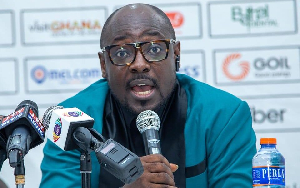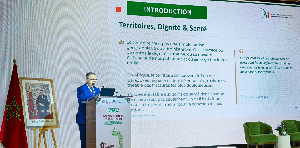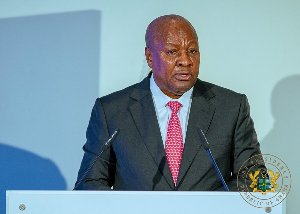Tema, Nov 13, GNA -- Mawuli Amegadzi, the 45-year-old Togolese Paedophile who sucked the genitals of two boys has been sentenced to a 20-year jail term by the Tema Circuit Court 'A'.
Amegadzi was convicted on his own plea of guilty on two counts of having unnatural canal knowledge of the boys.
The court presided over by Mrs. Lorinda Owusu, sentenced him to 20 years on each of the two counts, to run concurrently. Prosecuting, Chief Inspector Matilda Tetteh, told the court that the complainant who is father of two of Amegadzi's victims, resides in the same vicinity as the convict, who is a mason at Kpone-Kokompe near Tema. Chief Inspector Tetteh said the father observed that his sons aged eight and 11 always returned home from town with candies, biscuits and football and, therefore, questioned them on several occasions. The man, the prosecution said, intensified his questioning when he received information from neighbours that for some time now, they had been seeing his two sons coming out from the residence of Amegadzi who was known for such acts.
The prosecution indicated that the victims, who initially refused to confide in their father, narrated their ordeal to him. Chief Inspector Tetteh told the court that, according to the victims, the convict sucked their genitals while he masturbated to discharge on to the floor, and then gave them the items. The victims' father lodged a complaint with the Kpone Police, which also transferred the matter to the Domestic Violence and Victims Support Unit (DOVVSU) of the Tema Regional Police Command. Chief Inspector Tetteh said Amedadzi who was apprehended on November 10, has similar cases pending in court. Before his sentence was read to him, Amegadzi told the court that he started the act when he was 13 years old, and because it has become a habit, he finds it difficult to stop. 13 Nov 09
NSOC 002 Social RTI Medicine Patients have the right to know their state of health-Ampaw
Accra, Nov. 12, GNA -Medical Practitioners must as a matter of duty and law inform patients about the state and condition of their health and remedies available, Mr. Akoto Ampaw, Executive Member of the Right to Information Coalition of Ghana, has said. "In order to respect the autonomy of the patient, it is important that he or she is fully informed about and understand the potential benefits and dangers of the choice of treatment he or she is being given," he said. Speaking at monthly dialogue series of the African Commission of Health and Human Rights Promoters (CAPSDH), Mr. Ampaw said the patient had the right to be informed about his condition, treatment and the alternative choices and risks that go with them.
The dialogue on the theme: "Hippocratic Oath within the Framework of the Right to Information," seeks to create a platform for health professionals and human rights activists to discuss the oath and scrutinize the RTI bill, which will set the pace for combining health knowledge with knowledge of law and ethics.
According to Mr. Ampaw, any breakdown in communication between the medical practitioner and the patient can lead to tension, disagreement and resentment.
"Unfortunately, partly because of the pressure on our doctors, the mass production character of their practice and sometimes the elitist attitudes of doctors to simple ordinary patients, many medical doctors do not in their practice demonstrate this responsibility to inform the patient about his condition and the treatment being given," he said. Mr. Ampaw said in most of these cases, patients were simply treated as objects and not autonomous human beings capable of understanding their condition and the nature of treatment prescribed.
This, he said, was dangerous because it "dis-empowers" the patient who might commit some error because of lack of full disclosures of the nature of the ailment and treatment by the medical practitioner. He said part of the Hippocratic Oath that enjoined medical practitioners to keep secrets raised the question of patient-medical practitioner privilege, the matter of confidentiality of information that comes to the knowledge of the medical practitioner in the course of his treatment of patient.
Mr. Ampaw said the country's Evidence Decree does not provide for a general patient-physician privilege, rather made provision for confidentiality of communication between patient and a physician or psychologist etc in the diagnosis or treatment of a mental or emotional condition. The anomaly, he said, was corrected by the RTI Bill which sets out a general patient-physician or other medical expert privilege of communication.
On sanctions for medical practitioners who violate the Hippocratic Oath, Mr. Ampaw said the law gave authority to the Medical and Dental Council to secure the public interest by ensuring the highest standards in the practice of medicine and dentistry. The council plays this role through the penal and disciplinary committees by examining complaints against practitioners and effecting the appropriate punishment. Mr. Ampaw was, however, not happy about the lack of guidelines as to what constitutes 'infamous conduct in a professional respect,' saying it was unsatisfactory to give the disciplinary committee such wide discretion to determine what constituted infamous conduct. He has, therefore, urged the medical Council to evoke the power to make by-laws vested in it by the Medical and Dental Act to establish clear guidelines for medical practitioners as is the case in the United Kingdom. "I would like to suggest that the Ghana Medical Association takes the lead in consulting with the Ministry of Health and the Attorney General to ensure that we also have some elaborate binding rules to guide medical practitioners in carrying out their profession in an ethical manner," he said. On the RTI Bill, he said the medical profession and practitioners would be affected in varied ways by the character of the provisions of a right to information law. The law can contribute to enhancing the practice in the cause of saving peoples' lives.
He said people's right to access information had been widely recognized as an essential pre-requisite for an effective and functional democracy. In Ghana, this is echoed in Article 21 (1) (f) of the 1992 Constitution which provides for every individual's right to information subject to such qualifications and laws as are necessary in a democratic society. This is, however, subject to exemptions that are necessary and consistent with the protection of the public interest in a democratic society. This will foster a culture of transparency and accountability in public affairs, to contain corruption and to provide for related matters. The law places an obligation on public agencies and private bodies to provide to any person access to information and in response to a formal request received, in a timely, inexpensive and reasonable manner. Professor Kwame Karikari, Executive Director, Media Foundation for West Africa, expressed the hope that the dialogue series would create awareness on rights of individuals to health care. He said the right to information was vital for patients to know what was wrong.
Dr Edmund Delle, President of CAPSDH, said the dialogue was to create a platform for human rights and health advocates to begin the process of sharing experiences; to stimulate the creation of collaborative networks for research, education, communication and advocacy; and strengthen national solidarity among people working in health and human rights fields. 13 Nov. 09
General News of Friday, 13 November 2009
Source: GNA












